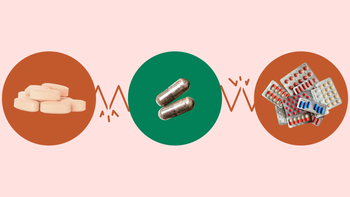
6 Vitamins and Supplements for Energy: What the Science Says
Key takeaways:
If you have low energy, certain vitamins and supplements may help improve your symptoms. Low levels of B vitamins, vitamin D, and iron can cause fatigue. But taking these vitamins is only likely to improve your energy if your levels are low.
Ginseng, coenzyme Q10 (CoQ10), and ashwagandha may all help increase energy. But they have side effects and potential drug interactions to consider. So it’s best to get a healthcare professional’s OK before you try any of these supplements.
Eating a well-rounded diet and exercising regularly are the best ways to keep your energy levels up. But if you have fatigue that is bothersome, talk to your primary care provider. They can check your vitamin levels and screen for conditions that could be draining your energy.
Table of contents

If you’re feeling tired and rundown, it’s possible that you’re not getting enough nutrients from your diet. Sometimes, taking an over-the-counter supplement can help. But which supplements are best?
Below, we’ll review what the science says about six of the most common supplements and vitamins for energy.
1. Vitamin B complex
B vitamins are often associated with energy levels and for good reason. There are eight different B vitamins, often referred to as B complex:
Thiamine (B1)
Riboflavin (B2)
Niacin (B3)
Pantothenic acid (B5)
Pyridoxine (B6)
Biotin (B7)
Folic acid (B9)
Cobalamin (B12)
Search and compare options
Your body needs B vitamins in order to build adenosine triphosphate (ATP) out of the food you eat. ATP is the energy source for your cells. Some B vitamins also play a role in making red blood cells and delivering oxygen to the body.
In the brain, B vitamins support healthy levels of chemicals such as dopamine and serotonin, which help regulate mood and energy levels. These chemicals are also involved in helping the brain function normally.
Low levels of B vitamins can lead to fatigue, muscle weakness, and foggy thinking. You’re at a higher risk for this if you’re over the age of 65, have inflammatory bowel disease, or drink a lot of alcohol. Certain medications, such as metformin, can also lower some B vitamin levels. But the main cause is not eating a well-rounded diet that contains meat, leafy vegetables, and whole grains. People who don’t eat meat are at a higher risk for low B vitamin levels, since animal-based products are the primary source of these vitamins.
A vitamin B complex supplement can improve energy and lessen fatigue if your levels are low. But if your vitamin B levels are normal, there’s not any evidence that taking this type of supplement will make a difference. This is because B vitamins are water soluble, meaning your body can’t store them for later. Any extra B vitamins in your system leave your body when you pee.
Energy-filled foods: Raise your energy levels by adding these power-packed foods to your diet.
Exercise boost: Exercise can improve your energy levels. Use these helpful tips to find the motivation to get moving.
Fatigue 101: Are you having an afternoon slump, or is something else to blame? Explore common causes of fatigue and how to combat them.
2. Vitamin D
Vitamin D helps your body absorb calcium and plays an important role in keeping your bones healthy. It’s made by your body when your skin is exposed to sunlight. It’s also added to most milk products and non-dairy milk alternatives.
Low vitamin D levels are common. In fact, about 50% of the worldwide population has insufficient vitamin D levels. Vitamin D deficiency (blood levels below 20 ng/mL) is more common in older adults. But it can happen to anyone, especially those who spend most of their time indoors.
Fatigue is a common symptom of low vitamin D levels, although we’re not exactly sure why. One study of 174 people with fatigue symptoms found that 77% of participants had low vitamin D. Taking a vitamin D supplement improved their symptoms.
Keep in mind that too much vitamin D can be toxic. It’s a fat-soluble vitamin, so your body can’t get rid of extra amounts through your pee like with B vitamins. It’s best to have your levels tested by a healthcare professional before taking a vitamin D supplement. They can see if you’re deficient in the vitamin and suggest the right supplement dosage if needed.
3. Iron
Iron is vital for making red blood cells. And red blood cells deliver oxygen to your body through your bloodstream. Low iron levels can lead to a condition called anemia, which is when you don’t have enough red blood cells to deliver oxygen to your body. And one of the hallmark signs of iron-deficiency anemia is feeling fatigued. This is why many people turn to iron supplements when they’re feeling more tired than usual.
Having low iron levels is more common in the U.S. than you might think. Infants, young children, and premenopausal women are more likely to have low iron levels. If you don’t eat meat, you’re also at risk, since it’s harder for the body to absorb iron from plant-based foods. Taking a proton pump inhibitor, such as omeprazole (Prilosec), can also lower iron levels. These medications can prevent iron from being absorbed by decreasing how much stomach acid you produce.
Read more like this
Explore these related articles, suggested for readers like you.
If you have anemia caused by low iron levels, an iron supplement can help improve your energy levels. But it’s best to avoid taking extra iron if you don’t need it. Too much iron can cause stomach problems and, in some cases, it can even be dangerous. You should only take an iron supplement if your prescriber recommends it.
Good to know: If you have low iron levels, it’s a good idea to pay attention to your vitamin C intake, too. Vitamin C helps you absorb iron. So it’s important you’re getting enough vitamin C through your diet or, if needed, via a supplement.
4. Ginseng
Ginseng is an adaptogen: a plant-based compound that helps the body manage stress. It’s a common ingredient in energy drinks and supplements due to its supposed fatigue-busting effects.
The active compounds in ginseng are called ginsenosides. These compounds are thought to have anti-inflammatory and antioxidant effects. And they may also help regulate your blood glucose (sugar) levels. This combination of effects may help improve energy levels and reduce fatigue.
There’s not a lot of quality evidence that ginseng actually improves energy levels. But the limited information we have seems to show that it may help improve fatigue symptoms in people with chronic illness. There’s also some evidence that ginseng can improve fatigue symptoms related to other health conditions, such as cancer.
Taking ginseng is generally considered safe. But ginseng can still cause side effects, such as trouble sleeping, nausea, and diarrhea. It can also raise your blood pressure and increase your risk of bleeding. So it’s best to get your healthcare professional’s OK before trying a ginseng supplement.
5. CoQ10
Coenzyme Q10 (CoQ10) is a popular supplement for heart health. But it may also help improve energy levels. CoQ10 is an antioxidant that’s made naturally in the body and plays a role in energy production.
A review of 13 clinical trials showed that CoQ10 had a significant effect on reducing fatigue levels in study participants. This held true for people with general fatigue, as well as those with fatigue related to a chronic health condition. But it did take about 3 months for CoQ10 to work in those with a chronic condition.
There’s mixed evidence for CoQ10’s effect on athletic performance in healthy people. Some studies have shown positive results, but others have shown no benefit.
CoQ10 may cause side effects such as nausea and diarrhea. But it’s generally considered safe for most people. Still, it’s best to talk to your healthcare team before trying it.
6. Ashwagandha
Ashwagandha is an adaptogen that’s been used for thousands of years as part of Ayurvedic medicine (an ancient medical practice from India).
Most studies have looked at ashwagandha’s effect on stress and anxiety, not on energy levels. But the findings have shown that ashwagandha may indirectly increase energy levels by improving sleep and reducing anxiety symptoms.
There’s also some evidence that ashwagandha may improve athletic performance, muscle strength, and recovery. This may be due to its antioxidant effect. Ashwagandha also seems to help increase oxygen delivery to the body during exercise.
Common ashwagandha side effects include nausea, diarrhea, and drowsiness. But it can also cause more serious issues, such as liver and thyroid problems, and interact with medications. So it’s best to have your healthcare professional review your medical history and medication list before taking ashwagandha. They can make sure it’s a safe option for you.
What’s the best way to increase your energy levels?
The best way to keep your energy levels up is to make healthy lifestyle choices, such as:
Stick to a regular sleep schedule.
Eat a balanced diet.
Try a daily meditation practice or other stress-management tools.
Reduce or eliminate drinking alcohol and smoking.
If your energy levels are still low, talk to a healthcare professional. They can do blood work to check your vitamin and nutrient levels. They can also screen for other conditions that could be making you feel tired.
The bottom line
If you’re feeling tired, certain vitamins and supplements may help improve your energy levels. Some, such as B vitamins, vitamin D, and iron, will probably only help improve your energy levels if you aren’t getting enough from your diet. Others, such as coenzyme Q10 (CoQ10), ginseng, and ashwagandha, may give you more energy through antioxidant and antianxiety effects. But all vitamins and supplements have side effects and drug interactions to consider before trying them.
The best way to improve energy levels is to make healthy lifestyle choices. But if fatigue is interfering with your daily routine, talk to a healthcare professional. They can see if any of your vitamin levels are low and check for other causes of fatigue.
Why trust our experts?



References
Ali, M. A., et al. (2022). Dietary vitamin B complex: Orchestration in human nutrition throughout life with sex differences. Nutrients.
Arring, N. M., et al. (2018). Ginseng as a treatment for fatigue: A systematic review. The Journal of Alternative and Complementary Medicine.
Asif, A., et al. (2023). Vitamin D toxicity. StatPearls.
Bonilla, D. A., et al. (2021). Effects of ashwagandha (Withania somnifera) on physical performance: Systematic review and Bayesian meta-analysis. Journal of Functional Morphology and Kinesiology.
Di Molfetta, I. V., et al. (2024). Vitamin D and its role on the fatigue mitigation: A narrative review. Nutrients.
Dunn, J., et al. (2023). Physiology, adenosine triphosphate. StatPearls.
Hanna, M., et al. (2022). B vitamins: Functions and uses in medicine. The Permanente Journal.
Kennedy, D. O. (2016). B vitamins and the brain: Mechanisms, Dose and efficacy—a review. Nutrients.
Lykstad, J., et al. (2023). Biochemistry, water soluble vitamins. StatPearls.
MedlinePlus. (2023). Pantothenic acid and biotin.
MedlinePlus. (2023). Riboflavin.
Mikulska, P., et al. (2023). Ashwagandha (Withania somnifera)—current research on the health-promoting activities: A narrative review. Pharmaceutics.
Moustarah, F., et al. (2024). Dietary iron. StatPearls.
National Center for Complementary and Integrative Health. (2018). Ayurvedic medicine: In depth. U.S. Department of Health and Human Services.
National Center for Complementary and Integrative Health. (2023). Ashwagandha. U.S. Department of Health and Human Services.
National Institutes of Health, Office of Dietary Supplements. (2023). Ashwagandha: Is it helpful for stress, anxiety, or sleep? U.S. Department of Health and Human Services.
National Institutes of Health, Office of Dietary Supplements. (2023). Iron fact sheet for professionals. U.S. Department of Health and Human Services.
National Institutes of Health, Office of Dietary Supplements. (2023). Vitamin D fact sheet for professionals. U.S. Department of Health and Human Services.
Nowak, A., et al. (2016). Effect of vitamin D3 on self-perceived fatigue. Medicine.
Pepper, K. J., et al. (2009). Evaluation of vitamin D repletion regimens to correct vitamin D status in adults. Endocrine Practice.
Pérez-Gómez, J., et al. (2020). Effects of ashwagandha (Withania somnifera) on VO2max: A systematic review and meta-analysis. Nutrients.
Ratan, Z. A., et al. (2021). Pharmacological potential of ginseng and its major component ginsenosides. Journal of Ginseng Research.
Roy, S., et al. (2014). Correction of low vitamin D improves fatigue: Effect of correction of low vitamin D in fatigue study (EViDiF study). North American Journal of Medical Sciences.
Shukla, S., et al. (2018). CoQ10 a super-vitamin: Review on application and biosynthesis. 3 Biotech.
Sizar, O., et al. (2023). Vitamin D deficiency. StatPearls.
Sood, B., et al. (2024). Coenzyme Q10. StatPearls.
Tardy, A. L., et al. (2020). Vitamins and minerals for energy, fatigue and cognition: A narrative review of the biochemical and clinical evidence. Nutrients.
Tippairote, T., et al. (2022). Combined supplementation of coenzyme Q10 and other nutrients in specific medical conditions. Nutrients.
Tsai, I. C., et al. (2022). Effectiveness of coenzyme Q10 supplementation for reducing fatigue: A systematic review and meta-analysis of randomized controlled trials. Frontiers in Pharmacology.
Yang, J., et al. (2022). Ginseng for the treatment of chronic fatigue syndrome: A systematic review of clinical studies. Global Advances in Health and Medicine.
Zhu, J., et al. (2022). Efficacy of ginseng supplements on disease-related fatigue: A systematic review and meta-analysis. Medicine.





























